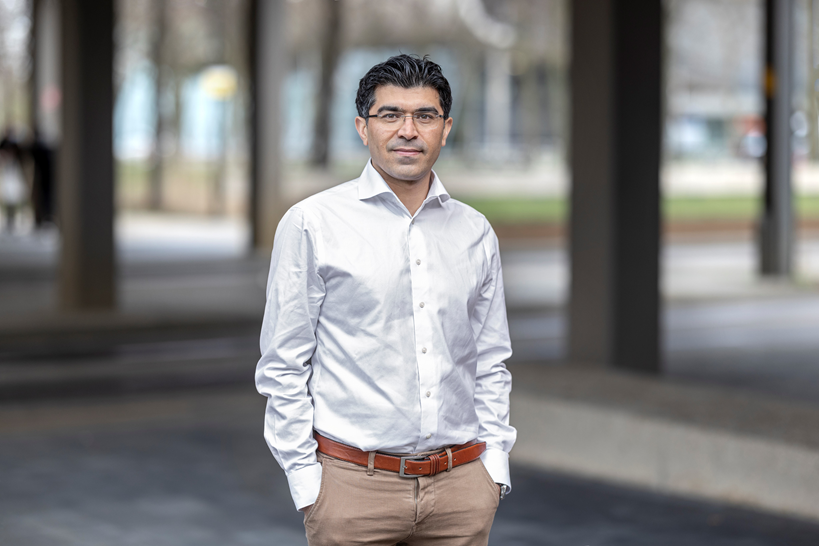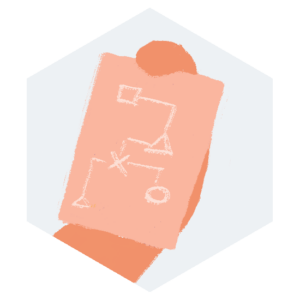Part 2: Interview with Ayoub Bagheri
CUCo is consulting with each board member to gather their visions for the Centre for Unusual Collaborations, enhancing connections and fostering a creative community that will advance CUCo’s future initiatives. This time CUCo spoke with Ayoub Bagheri, who joined the CUCo board in May 2023. Ayoub is Associate Professor of NLP and Sociolinguistics at the Department of Methodology and Statistics at the Faculty of Social and Behavioural Sciences at Utrecht University. He is also board member and chair of the Interdisciplinary Research Committee of the Utrecht Young Academy. Ayoub leads the Natural Language and Text Processing (NLTP) group and is part of the Human Data Science lab (HDS). For up-to-date information about his activities, publications and projects, have a look at Ayoub’s’ profile.

Written by Helma van Luttikhuizen
Firstly, could you tell us a bit about yourself and what drives you as a researcher?
I am an associate professor in natural language processing (NLP), a branch of artificial intelligence (AI), and have been active in this field for almost 15 years. I lead a team of 16 researchers, including assistant professors, postdocs, and PhD students. So in terms of research, I mainly work on using these AI based methods, such as large language models for different applications at the same time for example in healthcare, education and media analysis.
What drives me as a researcher is not only advancing the technical aspects of AI but also addressing its societal implications. I am particularly passionate about ensuring AI systems are interpretable, ethically sound, and accessible to non-experts. My team works on challenges like reducing bias in AI, explainability of AI and large language models, and advocating for open science and open-source approaches to AI development. AI and data science has a pivotal role across diverse sectors, and I strive to contribute to its responsible and impactful integration into society.
In my work I focus on developing machine learning models while balancing the interplay of techniques, algorithms, and data. One application I explore is using these models to address societal questions, such as identifying bias in Dutch media around gender or immigration. My primary research interest lies in interpretable and reliable natural language processing—making NLP systems understandable and accessible to everyone, not just data scientists.
I am a strong advocate for open science and open-source models, contributing to a community-driven effort in a field often dominated by advanced commercial models. Ethical considerations are central to my work, as I aim to support informed decision-making in AI and data science applications. I collaborate with governmental organizations and various sectors to address challenges and provide educated insights on pressing topics. My commitment to open data, fairness, and ethical AI & NLP drives my research and guides my team’s approach to advancing this field.
What inspired you to get involved with the Centre of Unusual Collaborations and what do you perceive to be CUCo’s most important possible contributions?
As a board member of CUCo, I truly value the reputation we have built, and one of my main goals is to not only maintain that good name but also enhance it further. This is not always easy, as we have faced our share of challenges, however, I believe these challenges are part of every team’s journey, and overcoming them is what makes CUCo special.
What I find particularly inspiring about CUCo is its commitment to team science. This approach aligns with our goals at UU, where we emphasize collaborative work across disciplines. CUCo brings together a mix of junior and senior colleagues, and many of these junior researchers are creating innovative networks and collaborations. Sometimes, these colleagues come in with incredible project ideas but may lack the experience or support needed to carry them forward.
For instance, in my own work, I have seen how valuable it is to connect with experts from entirely different fields to bring a project to life. It is this ability to bridge gaps and foster interdisciplinary partnerships that sets CUCo apart, making it a hub for transformative research and collaboration.
As a CUCo board member, I am deeply inspired by our ability to foster collaboration among researchers. While we may not have large funding, our strong network and supportive environment help researchers form teams, share ideas, and create projects that often grow into impactful, even national, initiatives. What I find really interesting in CUCo is its emphasis on interdisciplinary team science. We enable researchers to step out of their comfort zones and tackle interdisciplinary, transdisciplinary, or seemingly impossible challenges. By providing not only funding but also guidance and workshops, we turn ambitious ideas into actionable solutions.
It is not always easy, but hearing how teams solve challenges and apply CUCo’s methods shows the power of collaboration. CUCo empowers researchers to dream big, act together, and make meaningful progress—something I am proud to be part of.

In your opinion, what are some of the key challenges and opportunities in fostering inter- and transdisciplinary collaborations, what role can CUCo play in this?
As a CUCo board member, I have seen firsthand the effect of our approach in fostering interdisciplinary collaboration. CUCo is proof that researchers from diverse institutes and disciplines can come together to tackle societal challenges with impact. While we currently work within a defined network of four institutes, the enthusiasm from researchers across other Dutch universities shows there is a growing demand to expand CUCo’s model nationwide.
I often hear from colleagues outside the alliance expressing their interest in joining CUCo projects. Some have even collaborated informally, highlighting the potential for broader integration. What makes CUCo special is its focus on team science, the balance of process, team, and topic, and its ability to facilitate meaningful connections that individual researchers or universities alone may struggle to achieve. I believe CUCo’s strength lies in its focus on collaboration, with the term “unusual” highlighting the unique partnerships it facilitates—those that are not typically achievable within the confines of a single institution.
Expanding CUCo would mean providing this proven framework to more institutions, enabling greater collaboration across the Netherlands. It is not about scaling for the sake of it but about offering researchers the opportunity to contribute to projects that benefit society. I do believe this model, with its clear structure and openness, can inspire even more impactful research, uniting institutions toward shared goals. Although there are challenges in terms of resources and time. I think we have a great team and a solid setup with good plans in place. I really enjoy working with the current board, and I have appreciated the contributions of former board members as well. Meetings with the founders helps me learn how to move forward and refine our approach. The main challenge I see is figuring out how to continue this work effectively in the long term. I would say it would be good to extend CUCo by including more institutes and universities. This is something that would benefit the country, and we have already seen positive results with four institutes. We have proof that CUCo is working well with different projects, as showcased in the recently published paper Finding joy, creativity and meaning through unusual interdisciplinary collaborations.
Having been a board member now for some time, can you reflect on some of your main lessons and insights on inter- and transdisciplinary collaborations or about CUCo more general? Are there any specific projects, ways or working or initiatives that you are excited about, were surprised by or that you would like to see more of?
I believe that research should ultimately serve society and people, rather than being confined to just scientific purposes. While some may say they do research solely for science, I think research should have a broader impact. The opportunity provided by CUCo is unique allowing collaboration across universities in the Netherlands, bringing together a diverse range of disciplines. This collaborative environment creates a chance to work on meaningful projects that benefit society, which is a far-reaching and valuable opportunity. The work we do, while maybe small in scale now, has a significant impact. This is something I have witnessed firsthand in projects within CUCo, where we collaborated as well with colleagues from other universities then the 4 institutions of the alliance. They were eager to contribute, which shows the value of this collaborative approach. We even had transdisciplinary projects, such as with the Water Museum which further demonstrates the potential of this method.
In the next five years, I think the key priority should be to expand these collaborations and bring people together, both nationally and beyond. We have short-term and long-term goals, and while a year ago, going national seemed not ready yet, I believe it can be within reach in the next five years. To achieve this, we need the support of the alliance of course, a unified voice across the Supervisory board. The aim is to make more projects possible, allowing researchers to continue their work while connecting with others and creating impactful outcomes. In my opinion, everything we do in CUCo is open and we strive to share our plans transparently with anyone interested.
Let’s say you could start a Spark team, no strings attached, what would you look at?
If I could start a Spark team with no strings attached, I would focus on applying natural language processing (NLP) and language models to detect and understand Human Behaviour. This is part of a various of interdisciplinary projects I am already working on, and it has the potential to be transdisciplinary. The goal is to explore how NLP and text mining tools can be used in various fields, such as healthcare, social sciences and humanities where they could assist professionals and users. I see a lot of potential for NLP to contribute to diverse fields, and I would even like to bring together international collaborators to push this research further under an international umbrella of CUCo. The key is not to replace people but to enrich and support their work using AI technologies by learning human behaviour.